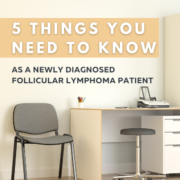Five Things You Need to Know As a Newly Diagnosed Follicular Lymphoma Patient
What’s important for newly diagnosed follicular lymphoma patients to know? In the “Follicular Lymphoma Treatment Decisions: What’s Right for You?” program, expert Dr. Tycel Jovelle Phillips from the University of Michigan Rogel Cancer Center shares five things newly diagnosed follicular lymphoma patients should know about your care and treatment.
1. Understand How Follicular Lymphoma Progresses
Follicular lymphoma progresses from stage I through stage IV, though you may be diagnosed after it has progressed past early stages. Stage I is when the cancer is localized to one area, stage II is on one side of the diaphragm, stage III is on both sides of the diaphragm, and stage IV could involve progression into an organ. The grade of follicular lymphoma indicates how large the cancer cells look under a microscope, starting with grade 1 and then grade 2, grade 3A, and grade 3B.
2. Learn About Factors in Treatment Decisions
Several factors can play into follicular lymphoma treatment decisions. A patient’s age, overall health, comorbidities, treatment side effects, and treatment goals must be considered in treatment options. Patients in early stages may have a more aggressive treatment approach, while later stage patients may have a treatment approach that prioritizes quality of life. But the age and physical condition must also be considered in the treatment approach. Make sure to talk to your doctor about any concerns you have about factors under consideration for your treatment options.
3. Know What to Expect for Treatment
Starting treatment for follicular lymphoma immediately is not always a given. Your doctor or care team may sometimes advise a period of watch and wait to monitor your progression instead. Reasons for waiting may include things like avoiding treatment side effects when there would be little benefit to fighting the cancer at its current stage.
4. Understand Your Role As a Patient
Follicular lymphoma patients now have more options to learn about treatment options. You can talk to patients and experts on social media or support groups to build foundational knowledge about available treatments. Also, getting second opinions is no longer the taboo that it used to be. In fact, many follicular lymphoma specialists also encourage their patients to get second opinions, since there is not currently a standard of care. Patients should not feel like you’re doing something wrong by seeking a second opinion.
5. Discover Why It’s Important to Speak Up
Though doctors can observe some patient information in blood tests and other lab work, they also must hear from their patients. Patients are the ones who know how you’re feeling, and this is why it’s vital for you to communicate with your doctor about any symptoms and side effects that you experience. Treatment can often be adjusted to minimize symptoms and side effects to provide patients with optimal quality of life while fighting your cancer.
By taking time to learn more about their care and treatment, follicular lymphoma patients can gain confidence to work toward the best care for your unique situation.
See More from The Pro-Active Follicular Lymphoma Patient Toolkit










